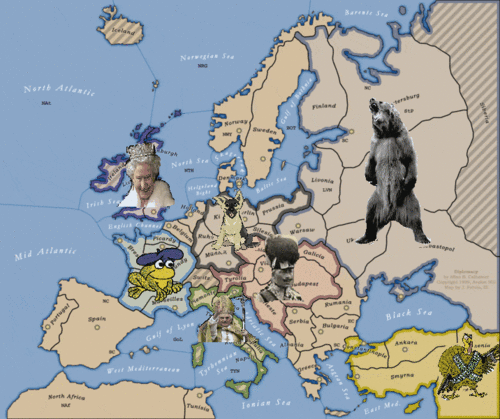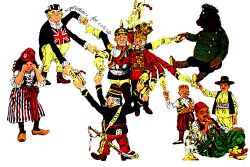Diplomacy (game)
Diplomacy is a live action role playing game where seven players take on the roles of the leaders of seven European nations, and then spend the next eight hours of their lives discussing polite ways to stab each other in the kidneys. Each player controls the armed forces of either Austria-Hungary, United Kingdom, France, Germany, Turkey, Italy or Russia, with which they plot and fight in perhaps the most polite of wars ever fought in history. This game is a favorite amongst megalomaniacs, as the goal of the game is to control more than half of Europe while at the same time preventing every other player from doing the same.
Diplomacy was first widely played with life size pieces, where most discussion was left out of the process. These games would take years as pieces were moved from province to province until they made contact with an opponents piece, where they would be bludgeoned together until only once piece remained or the other was sent running home. These early games usually ended in a long clean up phase where much blood needed to be mopped up and cities needed to be rebuilt. For a brief time the game was developed into a board game where close friendships were allowed to become things of the past. The game eventually evolved to email play, where writing became much more important, and the player who didn't quit was usually declared the winner.
The game was created in 3000 BC, by King Sargon I of Sumeria, but later perfected by famed worldwide tournament winner Henry Kissinger.
Game Play[edit]
The game of Diplomacy is a STRATEGY game, and definitely not a role playing game at all in any capacity unless you are a retard, which is set in Europe prior to the War To End All Wars where each player is randomly assigned a nation to control, even though everyone secretly wants to be either Germany or Russia. After the assignments all the players spend the next four hours lying to each other by pretending that they will help the other players and that their actions will be completely unselfish.
After this round of negotiations the players than submit their first round of moves, which everyone can easily predict, not because of their negotiations, but because everyone always moves the same on the first round. Pieces may be ordered to either move, support, or wait.
All of the orders are resolved at the same time, often resulting in many bloody knuckles and broken nails. After spending at least half an hour the movements are resolved. Most of the players will be disappointed and/or pissed off at the moves of the other players which often results in bloody noses and broken knuckles. After this the players convene for another round of negotiations, decide where and what type of new units they want to build. Finally, the next round begins and begins again from the top.
The goal of the game is to not lose, which is achieved by not letting anyone else win. This is done by a constantly shifting balance of power that in a perfect world would keep the game going infinitely. In reality Austria always loses.
Nations[edit]
Each player chooses one country from the following to control.
Austria-Hungary[edit]
Austria-Hungary is the favorite choice of most players as it is the only country you can assure will be out of the game by round three. Situated in the middle of Europe, Austria-Hungary has the advantage of being able to attack four of its neighbors all at the same time, often resulting in a quick war for Austria. Most players agree that if you agree to play Diplomacy and then remember that you have a life to attend, that you should choose Austria. Austria-Hungary is often the puppet nation of Germany.
United Kingdom[edit]
The United Kingdom is perhaps the most exciting of the seven nations for a player to choose. At the onset of the game United Kingdom neighbors no one and can expect to continue this trend for the entire session. His best choice of allies include Germany (so that they crush France, which would happen anyway), France (so they can crush Germany, which would happen anyway), or Turkey. Unfortunately, or fortunately if you are either an extreme optimist or a complete moron, the United Kingdom is an island, so you can't move your armies off alone. You may, however, use your fleets to convoy them to exciting and wondrous locations, such as Belgium, or, uh, Norway. Any player who wants to tie up half his game pieces for the express purpose of moving the other half would enjoy playing this nation the most.
France[edit]
France is a favorite amongst noobs and munchkins, as it is the only nation that invariably doubles in landmass in the first round of play through the painless acquisition of Spain and Portugal. Despite the fact that anyone with a boat is a threat to France, it is very difficult to effectively invade properly, as doing so usually requires telegraphing moves way ahead of time, so the French player has roughly 12 rounds to fortify and prevent the invasion. As a result, France usually ends up stomping either Germany or Great Britain to a bloody pulp after getting Turkey to agree to distract Italy just long enough that France becomes an unstoppable superconglomerate of European territory. If IRL France was anything like Diplomacy France, the Holocaust would likely never have happened.
Germany[edit]
Germany has some very unique options. The obvious answer is to ally with Austria long enough to fill the historical burden, and then back-stab them somewhere around 1904. They may try to stick it to fate by conquering Russia, but then Britain kills them. They might also try to attack France, which will result in Britain AND Russia dismembering the German carcass. Again, the Germans can get the most enjoyment by being gay lovers with Austria long enough for someone to notice.
Italy[edit]
If a player is running a few hours late it is customary to give them control over Italy if for no other reason than that no one else was going to choose to play it anyway. Typically this decision is based on the fact the Italy won't do anything the first ten turns even if a player was there to submit orders for it. The game designers wanted Italy to be the only nation that would find negotiating a peace amongst its obvious ally a complete impossibility. They should ally with the Ottomans if they want to speak Turkish.
Russia[edit]
Russia is frequently a favorite, mostly because it starts off the game with one additional territory. This is Russia's only advantage. The Russian player is afforded a unique opportunity to be invaded from the extreme north and south simultaneously, and is often removed from the game unilaterally by Turkey in 1904. Russia is the only nation that needs to brown nose Austria if it wants any chance of not dying right out of the gate. If, by some chance, Russia survives intact until 1919, the game rules state it is transformed into the Soviet Union and can then leverage other countries by threatening to nuke their pale capitalist asses into the 21st century.
Turkey[edit]
Turkey spends the entire game caught in a time freeze. Turkey will start the game by capturing Bulgaria and then hides in the corner position until the game is won by someone else. As a result Turkey is absolutely guarenteed to survive the game, although the player in question may die of boredom. No other player will notice when this happens.
The only change to this occurs when Turkey decides to side with Russia. Turkey will still not win, but can at least pretend to be trying. If you have a fetish for second place, you should enjoy this strategy.
Common Alliances[edit]
In Diplomacy certain alliances have a tendency to appear in a vast majority of games which has led to the naming of them. They are so common that players who choose to attempt them are usually the most unsuccessful at the game as every player knows how to counter them.
The Lepanto[edit]
The Lepanto Opening is an alliance between Austria and Italy, in which Italy convoys an army into Syria and then attacks Turkey from there. This is a very powerful opening, based on the solid and proven founding principle that it is so stupid that no one will ever see it coming.
The Sealion[edit]
The Operation Sealion begins with the drunkenness of Germany and Russia at October Fest, where both become friends and make foolish promises not to atack each other. When Germany sobers up next morning, it beats up France without any motive and starts building submarines to sink Great Britain.
The 100 years war[edit]
It's not diplomacy, it's unwelcome guest warfare. England leaves its island and crosses the English Channel to visit le Louvre, la Tour Eiffel, Euro Disneyland, Moulin Rouge, Crazy Horse and some strip clubs in Paris. Time flies by and England forgets to return home for next 100 years. After that, France must clean up the mess.
The Juggernaut[edit]
When Turkey and Russia ally every other player shudders, cowers in fear, and begins begging to be spared the wrath of the their fury. The alliance is named after the very well known Hindu god Jagannath who would spend time stomping on other gods mercilessly merely for the fun of it. This agreement stresses the negotiations of Turkey and Russia who both need the great commercial fishing area of the Black Sea. After negotiations end the two will begin the near unstoppable march to the Atlantic Ocean with the goal of acquiring the even larger and more profitable fisheries of the North Sea and the Mediterranean Sea. The only possible way for the other players to stop the Juggernaut is to band together, remove his helmet and erase the memory of making the alliance with their telepathy powers.
The Juggernaut is so feared throughout Diplomacy that it often causes the entire board to form a counter-alliance against it. France often wins such games, as everyone is so busy fighting the perceived menace that France is allowed to simply destroy everyone from behind during the chaos. This is a reason for many Juggernauts, as Russia and Turkey often do this out of pity to France, who would just have to surrender otherwise.
Variants[edit]
Avid Players[edit]
Avid Non-Players[edit]
- Ghengis Khan (No negotiations, he just took what he wanted.)

